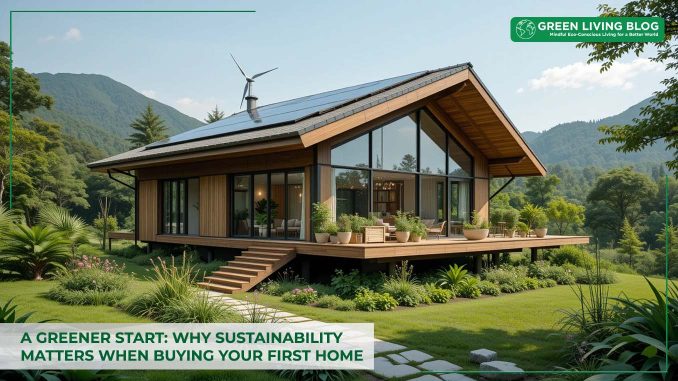
First-time homebuyers face many considerations when entering the property market, from location and price to size and amenities.
Increasingly, environmental sustainability has emerged as a main factor in this decision-making process.
As climate awareness grows and energy costs rise, the ecological footprint of a property can impact both its long-term value and running costs.
1. Understanding the Future Homes Standard

The UK housing sector is at the cusp of transformation with the upcoming Future Homes Standard (FHS). Set to be implemented in 2025, this regulation will fundamentally change residential construction requirements. According to the Ministry of Housing, all new homes built from 2025 must produce 75-80% fewer carbon emissions compared to current building regulations.
Because this standard mandates improvements in thermal efficiency through increased insulation and airtightness, alongside the installation of low-carbon heating systems like heat pumps. For first-time buyers, understanding these imminent changes gives valuable context – properties built to these specifications will likely maintain better value and need fewer costly retrofits in the future as environmental regulations tighten.
2. Energy Efficiency and Financial Benefits
The energy performance gap between new constructions and older housing stock delivers good financial benefits. The Electrical Review, citing government sources, states that data shows that 84% of new build homes achieved an Energy Performance Certificate (EPC) rating of A or B between 2019 and 2020, compared to just 5% of existing dwellings.
This translates to average annual energy savings of £555 for a typical semi-detached house built to current standards versus an equivalent property constructed in the 1930s. Over a 25-year mortgage period, these savings accumulate to nearly £14,000 – effectively offsetting a portion of the new build premium. Furthermore, as energy prices continue to fluctuate, these efficiency advantages provide valuable insulation against market volatility.
3. Innovative Sustainable Features

Modern construction techniques add many ecological innovations beyond basic energy efficiency. Many developments now feature water-saving fixtures that lower consumption compared to conventional installations. Smart home technology allows precise control of heating and cooling systems, further optimizing energy usage. Materials selection increasingly priorities reduced embodied carbon, with sustainable timber frames gaining popularity over traditional construction methods.
Some forward-thinking developments incorporate communal green spaces designed for biodiversity, sustainable drainage systems that lower flood risk, and infrastructure for electric vehicle charging – amenities that simultaneously increase quality of life while reducing environmental impact and carbon footprints.
4. Government Incentives and Support
First-time buyers can access various government programs that improve the affordability of sustainable properties. Green mortgages, for example, offer favourable rates for properties with high energy efficiency ratings, potentially reducing monthly payments throughout the mortgage term. For those considering the resale value of their first home, sustainability credentials are increasingly influential in buyer decisions. Properties with strong environmental features typically command premium prices and sell faster than less efficient equivalents, providing both immediate living benefits and future financial advantages.
When you prioritise sustainability when purchasing a first home, you can align environmental values with practical financial considerations while securing a property better prepared for future regulatory changes.
![]()
Author Profile

- Eco Warrior by day, Eco Blogger by night trying to get the eco balance right.
Latest entries
 Green GuidesNovember 3, 2025The Beginner’s Guide to Making Your Own Nontoxic Candles at Home
Green GuidesNovember 3, 2025The Beginner’s Guide to Making Your Own Nontoxic Candles at Home Green Home GuidesOctober 14, 2025What are Eco-Friendly Tissue Options for Modern UK Homes?
Green Home GuidesOctober 14, 2025What are Eco-Friendly Tissue Options for Modern UK Homes? Best practicesSeptember 17, 20253 Ways Young Families Can Commit to Sustainable Living
Best practicesSeptember 17, 20253 Ways Young Families Can Commit to Sustainable Living EnvironmentSeptember 9, 2025Eco-friendly Gardening on a Budget: 6 Sustainable Choices that make a Difference
EnvironmentSeptember 9, 2025Eco-friendly Gardening on a Budget: 6 Sustainable Choices that make a Difference





Leave a Reply
You must be logged in to post a comment.